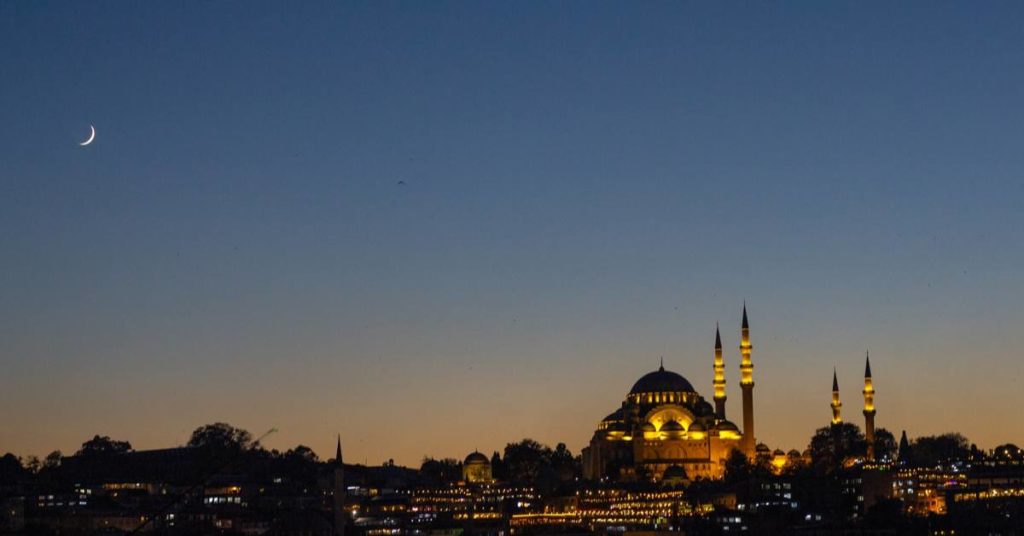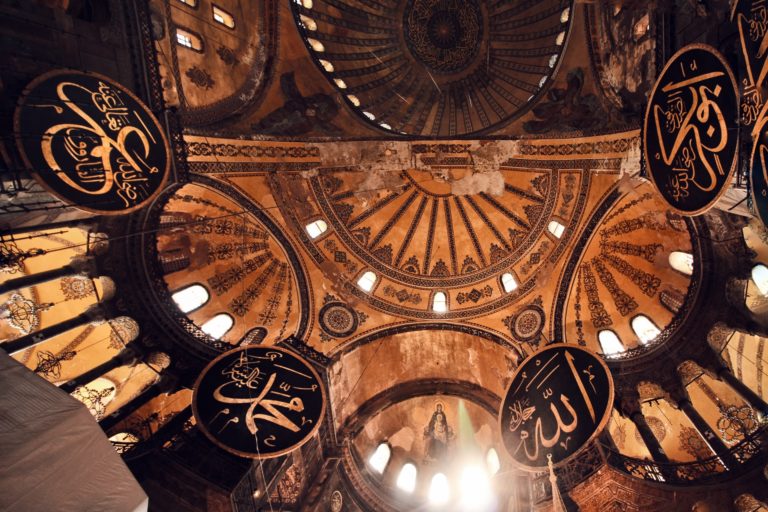Al-Ashhur al-Ḥurum
Linguistically; this phrase means the sacred months.
Technically; it refers to four sacred months in Islām among the twelve months of the hijrī year. Three of which are consecutive; Dhū al-Qaʿdah, Dhū al-Ḥijjah and Muḥarram. The fourth of which is Rajab which is between Jumādā and Shaʿbān.
Allāh ﷻ chose and made four months of the year distinctive from the rest in that He made them sacred. He ﷻ said: ‘So do not wrong one another during these months.’[1]سورة التوبة، الآية ٣٦.
Qatādah raḥimahullāh said: ‘Transgression during these sacred months holds greater offence than the rest of the year. And while transgression is dreadful in every instance, Allāh ﷻ made it even more dreadful during these four months. Indeed, He does as He wills.
Allāh has distinguished some of His Creation from among man and jinn, He has chosen Messengers. He has granted special virtue to His remembrance over all speech. From the land, He has chosen the masājid. He distinguished the day of Jumuʿah (Friday) from among the days and laylah al-qadr (the Night of Power) from among the nights. Therefore, respect what Allāh has honoured for indeed to honour things due to the virtue which Allāh bestowed upon them is among the traits of the intelligent.’ [2]تفسير ابن كثير. الجزء الثاني، ص ٣٦٩.
The Messenger of Allāh ﷺ said: ‘Time has completed a cycle and assumed the form of the day when Allāh created the heavens and the earth.[3]إشارة إلى الآية إِنَّمَا النَّسِيءُ زِيَادَةٌ فِي الْكُفْرِ يُضَلُّ بِهِ الَّذِينَ كَفَرُوا يُحِلُّونَهُ … المزيد The year contains twelve months of which four are sacred.
Three of them are in succession; Dhū al-Qaʿdah, Dhū al-Ḥijjah and al-Muḥarram. And (the fourth being) Rajab Muḍar (named after the tribe of Muḍar as they used to respect this month) which comes between Jumādā and Shaʿbān.[4]أخرجه البخاري في صحيحه في كتاب التفسير؛ باب قوله {إن عدة الشهور عند الله اثنا شهرا في كتاب الله يوم خلق … المزيد
Muḥarram
The month of Muḥarram is the first month in the hijrī year. It is the only month attributed to Allāh ﷻ in that it is mentioned as ‘the month of Allāh’. This demonstrates the sanctity and status of this blessed month. Because nothing is attributed to Allāh except that it worthy and virtuous such as ‘the Messenger of Allāh’ and ‘the House of Allāh’.
Abū Hurayrah raḍiyAllāhu ʿanhu reported that the Messenger of Allāh ﷺ was asked as to which prayer was most excellent after the prescribed prayer and which fast was most excellent after the month of Ramaḍān. He ﷺ said: Prayer offered in the middle of the night is the most excellent after the prescribed prayer and the most excellent fast after fasting in the month of Ramaḍān is the fast in Allāh’s month; al-Muḥarram.[5]أخرجه مسلم في صحيحه في كتاب الصيام؛ باب فضل صوم المحرم.
This month contains a day in which Mūsā ʿalayhissalām and his people was saved and in which Firʿawn were drowned. It is the 10th of Muḥarram; the day of ʿĀshūrā’.
Ibn ʿAbbās raḍiyAllāhu ʿanhumā reported that the Messenger of Allāh ﷺ arrived in Mādīnah and found the Jews observing fast on the day of ʿĀshūrā. The Messenger of Allāh ﷺ said to them: What is the significance of this day that you observe fast on it? They said: It is the day of great significance when Allāh delivered Mūsā ʿalayhissalām and his people, and drowned Firʿawn and his people.
Mūsā ʿalayhissalām observed fast out of gratitude and we also observe it. Upon this the Messenger of Allah ﷺ said: We have more right, and we have a closer connection with Mūsā than you have; so Allāh’s Messenger ﷺ observed fast (on the day of ʿĀshūrā), and ordered that it should be observed.[6]أخرجه مسلم في صحيحه في كتاب الصيام؛ باب صَوْمِ يَوْمِ عَاشُورَاء.
Therefore, to show our gratitude to Allāh, it is recommended to fast on this day. The reward of which is expiation for the sins of the preceding year.
Abū Qatādah raḍiyAllāhu ʿanhu narrated that the Messenger of Allāh ﷺ was asked about observing the fast on the tenth day of Muḥarram to which he replied: ‘It is an expiation for the sins of the preceding year.’[7]أخرجه مسلم في صحيحه في كتاب الصيام؛ باب اسْتِحْبَابِ صِيَامِ ثَلَاثَةِ أَيَّامٍ مِنْ كُلِّ شَهْرٍ وَصَوْمِ … المزيد
An act which bears resemblance to the Jews and Christians is frowned upon, which is why the Messenger of Allāh ﷺ intended to fast on the 9th. However, he passed away before he could do so. Hence, it is recommended to join the 10th of Muḥarram with a day before or after it.
Ibn ʿAbbās raḍiyAllāhu ʿanhumā reported that when the Messenger of Allāh ﷺ fasted on the day of ʿĀshūrā’ and commanded that it should he observed as a fast, his companions said to him: O Messenger of Allāh, it is a day which the Jews and Christians hold in high esteem. Thereupon, the Messenger of Allāh ﷺ said: When the next year comes, inshā’Allāh, we will observe fast on the 9th. But the Messenger of Allāh ﷺ died before the advent of the next year.'[8]أخرجه مسلم في صحيحه في كتاب الصيام باب؛ أَىُّ يَوْمٍ يُصَامُ فِي عَاشُورَاءَ.
The 10th of Muḥarram was also the day in which the beloved grandson of the Prophet ﷺ; Ḥusayn raḍiyAllāhu ʿanhu was blessed with martyrdom. However, lamenting and grieving over his death is not part of Islām.
ʿAbdullāh raḍiyAllāhu ʿanhu narrated that the Prophet ﷺ said: ‘He who slaps his cheeks, tears his clothes and follows the ways and traditions of the Days of Ignorance is not one of us.’[9]أخرجه البخاري في صحيحه في كتاب الجنائز؛ باب لَيْسَ مِنَّا مَنْ شَقَّ الْجُيُوبَ.
Rajab
Whenever the month of Rajab began, the Messenger of Allāh ﷺ used to say: ‘O Allāh, bless us in Rajab and Shaʿbān and allow us to reach Ramaḍān.’[10]رواه البيهقي في الدعوات الكبير.
Rajab is the key to the months of goodness and blessings. Abū Bakr al-Warrāq al-Balkhī said: ‘The month of Rajab is the month of cultivation. Shaʿbān is the month of irrigation and Ramaḍān is the month of harvest.’
He also said: ‘The similitude of Rajab is that of wind while Shaʿbān is that of clouds and Ramaḍān is that of rain.’
Rajab is a month in which we should prepare for the coming of Ramaḍān. Whatever misdeeds we’ve grown accustomed to, we should try to break that habit so that we can greet the month of Ramaḍān in a pleasing state and easily excel in our righteous deeds.
Dhū al-Qaʿdah
Among the distinguishing qualities of this blessed month is that the Messenger ﷺ performed three ʿumar (pl. ʿumrah) in this month except the fourth and final one which was performed along with his ḥajj.
It is also said that this month is the 30 days which Allāh ﷻ appointed for Mūsā ʿalayhissalām and the extra ten days that were added were the first ten days of Dhū al-Ḥijjah.
Dhū al-Ḥijjah
This blessed month is the twelfth and final month in the hijrī year. It is called Dhū al-Ḥijjah because it is the month in which the rituals of Ḥajj are performed. Allāh ﷻ distinguished the first ten days of this month from the rest of the year in that it is more beloved to Him and the rewards of righteous deeds are multiplied.
Ibn ʿAbbās narrated that the Messenger of Allāh ﷺ said: ‘There are no days during which righteous actions are so pleasing to Allāh than these days. Meaning the first ten days of Dhū al-Ḥijjah.’ They (the companions raḍiyAllāhu ʿanhum) asked: ‘O Messenger of Allāh. Not even the struggle in the path of Allāh (jihād)?’ He said: ‘Not even the struggle in the path of Allāh, except a man who goes out (in the path of Allāh) with his life and property and does not return with any of them.’[11]أخرجه أبو داود في سننه في كتاب الصيام؛ باب فِي صَوْمِ الْعَشْرِ.
‘Whoever is not able to stand at ʿArafah, stand before Allāh ﷻ in a way that He deserves.
Whoever is not able to spend the night at Muzdalifah, spend the night in obedience to Allāh ﷻ so that you may attain nearness to Him.
Whoever is not able to slaughter at Minā, slaughter your desires so that you can reach your objective.
Whoever is not able to reach the house of Allāh ﷻ because it is far, proceed towards the Lord of the Kaʿbah, for He is closer to you than the jugular vein.’
Imām Ibn Rajab al-Ḥanbalī raḥimahullāh
This blessed month contains two days which are precious in the eyes of Muslims. The first one being the day of ʿArafah; the ninth of Dhū al-Ḥijjah and the day of ʿīd; the tenth of Dhū al-Ḥijjah.
The ninth is the day in which Allāh ﷻ revealed the following āyah; ‘Today I have perfected your faith for you, completed My favour upon you, and chosen Islām as your way. But whoever is compelled by extreme hunger — not intending to sin — then surely Allāh is All-Forgiving, Most Merciful.’[12]سورة المائدة؛ الآية ٣.
ʿĀ’ishah raḍiyAllāhu ʿanhū reported that Allāh’s Messenger ﷺ said: ‘There is no day when Allāh sets free more servants from Hell than the Day of ʿArafah.’[13]أخرجه مسلم في صحيحه في كتاب الحج؛ باب فِي فَضْلِ الْحَجِّ وَالْعُمْرَةِ وَيَوْمِ عَرَفَةَ.
Ṭalḥah ibn ʿUbaydullāh raḍiyAllāhu ʿanhu reported that the Messenger of Allāh ﷺ said: ‘The most excellent duʿā’ is the duʿā’ on the Day of ʿArafah and the best of what I and the Prophets before me have said is: “There is no god but Allāh, alone, without partner.”’[14]أخرجه مالك في موطئه في كتاب الحج.
As for the tenth, it is the first day of three to sacrifice an animal for the sake of Allāh to commemorate the practice of Ibrāhīm ʿalayhissalām. It is a day in which the piety and submission of Muslims to Allāh is tested.
Allāh ﷻ says: ‘Never does their meat or blood reach Allāh. Rather, it is your piety that reaches Him. This is how He has subjected them to you so that you may proclaim the greatness of Allāh for what He has guided you to, and give good news to the good-doers.’[15]سورة الحج؛ الآية ٣٧.
Thereafter, the following three days are called the days of tashrīq; the 11th, 12th and 13th of Dhū al-Ḥijjah. It is prohibited to fast during these days, rather we should indulge ourselves in the remembrance of Allāh and gratitude towards Him.
Nubayshah al-Hudhalī reported that Allāh’s Messenger ﷺ said: ‘The days of tashrīq are the days of eating and drinking.’ And in another narration, ‘the remembrance of Allāh ﷻ’ is added.[16]أخرجه مسلم في صحيحه في كتاب صيام؛ باب تَحْرِيمِ صَوْمِ أَيَّامِ التَّشْرِيقِ.
During these days, Allāh ﷻ has prescribed a takbīr to be said once after every farḍ ṣalāh for both men and women. This is widely known as takbīrāt of tashrīq. Women should say it quietly while men proclaim it loudly. This starts from the Fajr of the 9th of Dhū al-Ḥijjah till the ʿAṣr of the 13th of Dhū al-Ḥijjah.
The takbīrāt is as follows:
اللَّهُ أَكْبَرُ اللَّهُ أَكْبَرُ لَا إلَهَ إلَّا اللَّهُ وَاَللَّهُ أَكْبَرُ اللَّهُ أَكْبَرُ وَلِلَّهِ الْحَمْد
Allāhu Akbar, Allāhu Akbar, lā ilāha illalāhu, Allāhu Akbar Allāhu Akbar, wa lillāhi-l ḥamd.
Allāh is the greatest. Allāh is the greatest. There is no god but Allāh. Allāh is the greatest. Allāh is the greatest and all praises belong to Him.
It is good practice to set a reminder for this obligation since it’s very easily forgotten. One of the best ways to do so is attaching a written reminder on your prayer mat.
May Allāh allow us to reap all the benefits these sacred months has to offer. May He protect us from committing transgressions against ourselves and allow us to greet the new year. Āmīn.
الحاشية[+]
| ↑1 | سورة التوبة، الآية ٣٦. |
|---|---|
| ↑2 | تفسير ابن كثير. الجزء الثاني، ص ٣٦٩. |
| ↑3 | إشارة إلى الآية إِنَّمَا النَّسِيءُ زِيَادَةٌ فِي الْكُفْرِ يُضَلُّ بِهِ الَّذِينَ كَفَرُوا يُحِلُّونَهُ عَاماً وَيُحَرِّمُونَهُ عَاماً لِيُوَاطِئُوا عِدَّةَ مَا حَرَّمَ اللَّهُ فَيُحِلُّوا مَا حَرَّمَ اللَّهُ. |
| ↑4 | أخرجه البخاري في صحيحه في كتاب التفسير؛ باب قوله {إن عدة الشهور عند الله اثنا شهرا في كتاب الله يوم خلق السموات والأرض منها أربعة حرم} القيم هوالقائم. |
| ↑5 | أخرجه مسلم في صحيحه في كتاب الصيام؛ باب فضل صوم المحرم. |
| ↑6 | أخرجه مسلم في صحيحه في كتاب الصيام؛ باب صَوْمِ يَوْمِ عَاشُورَاء. |
| ↑7 | أخرجه مسلم في صحيحه في كتاب الصيام؛ باب اسْتِحْبَابِ صِيَامِ ثَلَاثَةِ أَيَّامٍ مِنْ كُلِّ شَهْرٍ وَصَوْمِ يَوْمِ عَرَفَةَ وَعَاشُورَاءَ وَالِاثْنَيْنِ وَالخَمِيس. |
| ↑8 | أخرجه مسلم في صحيحه في كتاب الصيام باب؛ أَىُّ يَوْمٍ يُصَامُ فِي عَاشُورَاءَ. |
| ↑9 | أخرجه البخاري في صحيحه في كتاب الجنائز؛ باب لَيْسَ مِنَّا مَنْ شَقَّ الْجُيُوبَ. |
| ↑10 | رواه البيهقي في الدعوات الكبير. |
| ↑11 | أخرجه أبو داود في سننه في كتاب الصيام؛ باب فِي صَوْمِ الْعَشْرِ. |
| ↑12 | سورة المائدة؛ الآية ٣. |
| ↑13 | أخرجه مسلم في صحيحه في كتاب الحج؛ باب فِي فَضْلِ الْحَجِّ وَالْعُمْرَةِ وَيَوْمِ عَرَفَةَ. |
| ↑14 | أخرجه مالك في موطئه في كتاب الحج. |
| ↑15 | سورة الحج؛ الآية ٣٧. |
| ↑16 | أخرجه مسلم في صحيحه في كتاب صيام؛ باب تَحْرِيمِ صَوْمِ أَيَّامِ التَّشْرِيقِ. |




